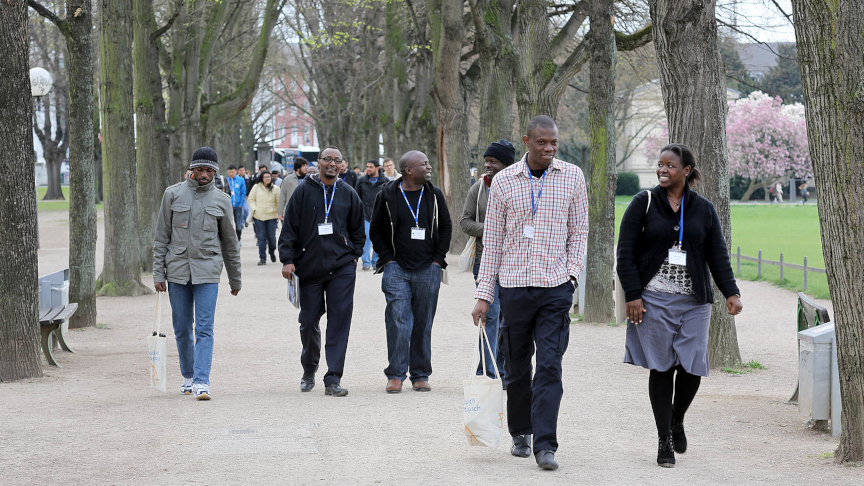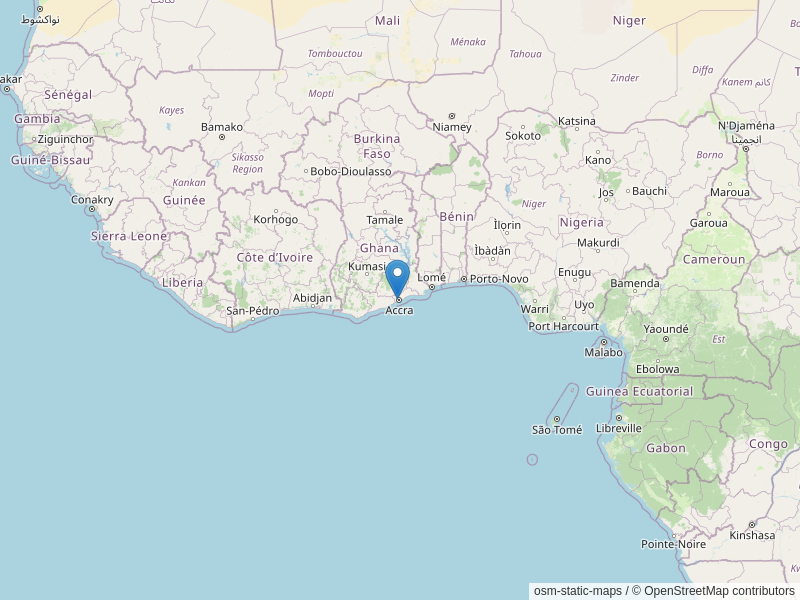Ghanaians in Germany

Germany is situated in the heart of Europe and shares its borders with nine neighboring countries, which is more than any other European state. You can be sure to notice this international atmosphere when you walk, ride or drive along its streets and roads. People from all the countries of the world live here. Out of the 82 million inhabitants, some 8 million have an international or migrational background. This has naturally left its mark for instance on the culinary landscape. Italian pizza houses, Spanish bodegas, Greek taverns and Turkish kebab stands as well as Chinese restaurants have become part of everyday city life. Germany is a many-sided and colorful as well as a safe country.
Most students in Germany either live in a single room, in a student hall or in private accommodation. A shared flat (called ‘Wohngemeinschaft’ or ‘WG’) is a very popular form of accommodation among students. Each flatmate has a room of his/her own and shares the kitchen, bathroom and sometimes a living room. You will need to get in contact with the International Office at the university of your choice to get more information on how to apply for a room in a student hall or how to find a private or shared flat. You can also make use of the following websites for finding a shared flat:
www.internationale-studierende.de/meta/studentenwerke
Other search engines:
Students have to bear their own living expenses such as accommodation, food, transport and health insurance, which amounts on the average up to 720 Euros per month. This is very moderate compared to other countries in central Europe. On the average, students‘ expenses for rent and utilities range from 200 to 250 Euros (depending on your location it might be more expensive); expenses for food and beverages amount to about 160 Euros; expenses for clothing are about 50 Euros. For learning materials it is around 35 Euros and for health insurance around 90 Euros. All Students have to pay a semester contribution, which frequently includes a semester ticket for public transportation in and around the university town.
Although sausages and beer are very popular in Germany, there are of course a lot of other typical foods and drinks for you to discover. Every part of Germany has its own specialities. In all the big cities in Germany, you will certainly find African shops (also known as ‘Afro Shops’) where you can buy nearly all your ingredients to prepare Ghanaian dishes. Eating out in restaurants can be quite expensive, therefore students usually eat at the Mensa (university canteen), which offers meals at low prices and provides good opportunities for students to connect with other people.
The public transportation network is very well-developed in Germany. For local travel, there are buses, S-Bahn (commuter train), U-Bahn (underground) and Straßenbahn (tram). Travelling by taxi is not as common as in Ghana and the fare can be quite expensive. For inter-city travel, the most popular means of transportation is by the Deutsche Bahn/DB or the German Rail. There are different types of trains available, e.g. the high speed ICE (Inter-city express). According to different needs, there are a variety of discount train fares and packages. Check for this at Deutsche Bahn under ‘Sparpreis’ or ‘Bahncard’.
For cost reasons, students sometimes prefer the ‘ride-sharing’ of private cars. For this, you may have to pay online via credit card, PayPal or direct bank transfer.
Some options are:
There are also various intercity bus service providers who offer reasonable opportunities to travel throughout the country.
Here are some options available:
Also find more options through Busliniensuche
Moreover, there are a number of budget flights connecting cities. These can sometimes be cheaper than train tickets. The bicycle is a popular and convenient means of transportation among the Germans, in small towns as well as in big cities. It is certainly not a bad idea to get yourself a second hand bicycle during your stay in Germany.
For the study stay in Germany you need a health insurance. Proof of this does not yet need to be presented at the visa interview, however, proof will be due after the visa has been issued. Initially, a Ghanaian travel insurance is sufficient for this purpose, after arrival in Germany, a health insurance must be available. Some of the blocked account providers offer packages that already include health insurance for Germany. More information about the health system in Germany can be found here.
As International Student, you are allowed to work 240 days on part-time basis or 120 days on full-time basis per calendar year. After you completed your stdies in Germany you may apply for a Job Applicant Visa. This visa is valid up to a maximum of 18 months. If you are able to find a job within your field of expertise, you may continue to live and work in Germany for the validity of your job contract.
Life in Germany also means to cope with seasonal weather changes. The country lies in a rather cool westerly wind zone between the Atlantic and the continental climate in the east. Extreme weather changes tend to be rare. The average winter temperature is between 1.5°C in the lowlands and minus 6°C in the mountain areas. July is the warmest month of the year with an average temperature of 18° C in the lower regions and 20° C in the sheltered areas of southern Germany. You can pursue leisure activities in accordance with the prevailing seasonal weather. Winter offers skiing, not only in the Alps to the south, but also in the hills and lower mountain ranges. Summer can be pleasantly spent on the beaches of the North and Baltic Sea or at one of the thousands of freshwater lakes all over Germany.
Before commencing your studies in Germany, find out about life in your future place of study! Get information on cities, daily life, travelling, eating in Germany and so on at: www.study-in.de
Ghanaians in Germany (Part 1)

Ghanaians in Germany (Part 2)





